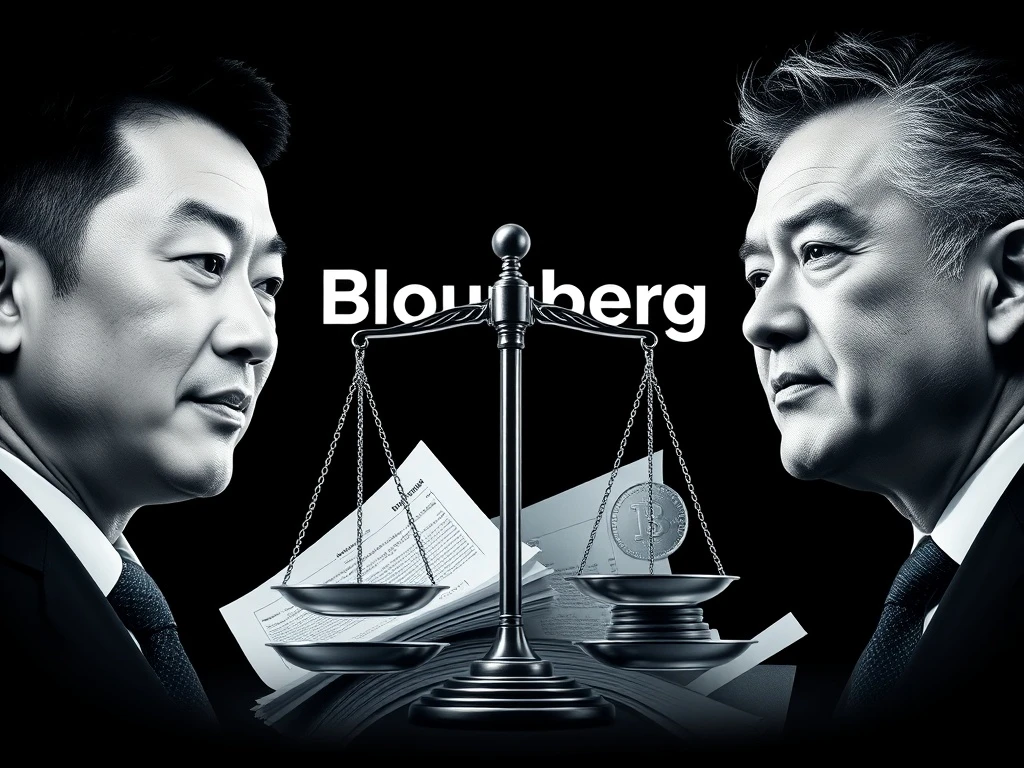Justin Sun’s Crucial Legal Dispute: Bloomberg Sued Over Crypto Holdings Data

A significant **legal dispute** has erupted between **Justin Sun**, the prominent founder of the **Tron** blockchain, and media giant **Bloomberg**. This high-stakes legal battle centers on the alleged misrepresentation of Sun’s personal **crypto holdings** on the prestigious Bloomberg Billionaires Index. Crypto enthusiasts and market watchers are closely following this case. It raises important questions about privacy, financial reporting in the digital asset space, and the accuracy of public financial indexes.
Setting the Stage for a High-Stakes Legal Dispute
The conflict began when **Justin Sun** initiated a lawsuit against **Bloomberg** in a Delaware federal court. He sought a temporary restraining order. Sun claimed the financial news outlet published false and private financial information. Specifically, this pertained to his profile on the Bloomberg Billionaires Index, released recently. Sun’s representatives stated through a blog post by **Tron** that the index “dramatically and dangerously misrepresents Mr. Sun’s assets.” Therefore, he moved to prevent further dissemination of what he considers highly confidential data. This action highlights the growing tension between traditional media and the rapidly evolving crypto world.
Justin Sun’s Core Allegations Against Bloomberg
Sun’s complaint details several key accusations. He asserts that **Bloomberg** published “inaccurate data” regarding his **crypto holdings**. Furthermore, he claims the outlet did so after explicit assurances of confidentiality. According to the filing, a Bloomberg journalist approached Sun’s team in February. The purpose was to include him in the Bloomberg Billionaires Index. To do this, they needed to verify his assets and confirm his net worth. Sun agreed to this process. He was given “explicit assurances” that his financial information, especially concerning his cryptocurrency holdings, would remain “strictly confidential.” Bloomberg reportedly promised to use this data solely for net worth verification. However, Sun alleges a breach of this agreement.
Sun’s complaint outlines specific concerns:
- Bloomberg reportedly planned to publish “specific financial holdings — in granular detail — alongside misstatements.”
- He believed the outlet would also use this private information for an “unrelated Bloomberg article.”
- Sun sent a cease and desist letter on August 2. He aimed to stop the publication of his holdings.
- Despite his efforts, the outlet confirmed it would still publish the article.
In the **Tron** blog post, Sun further elaborated. He stated the report attributes crypto holdings to him that “he has never owned, controlled or had any beneficial interest in.” Conversely, it “fails to report cryptocurrency holdings he does own.” Consequently, he claims publication of this detailed information “would cause significant harm.” It could subject him to a “significant risk of theft, hacking, kidnapping, and bodily harm to him and his family.” This personal security concern adds a grave dimension to the **legal dispute**.
Bloomberg’s Vigorous Defense: Upholding Press Freedom
Lawyers for **Bloomberg** swiftly pushed back against **Justin Sun**’s application for a temporary restraining order. They argued that the entire basis of the application was moot. The outlet had already published the information before Sun filed his application. Bloomberg stated Sun filed for the order just after 7 PM Eastern US time on Monday. However, the article had been published almost two hours earlier. This timeline is crucial to their defense. Therefore, they contend that the request for a restraining order is no longer applicable. Bloomberg also declined to comment directly on the ongoing litigation.
Bloomberg’s legal team plans a robust defense. They intend to argue that granting Sun’s application would infringe upon their First Amendment rights. These rights protect press and speech freedom. Such an action, they assert, would “gravely disserve the public interest.” Moreover, they plan to argue that Sun cannot demonstrate several key points. These include proving the article invaded his privacy or caused irreparable harm. Furthermore, they will contend that **Bloomberg** did not breach any promise to him. This defense centers on fundamental principles of journalistic freedom and public interest reporting.
The Tron Connection: How Holdings Were Reported
The **Bloomberg** Billionaires Index updated its profile on **Justin Sun** on Monday. The report indicated he owns a large amount of **Tron** (TRX). TRX is the native token of the blockchain he founded. Bloomberg attributed this figure to “an analysis of financial information provided by representatives of Sun in February 2025.” This specific detail suggests a direct link to the confidential information Sun claims was misused. The report also added that a majority of Sun’s net worth came from **crypto holdings**. This finding was also based on their analysis of his financial information. However, Bloomberg itself gave its confidence in this analysis only one star out of five. Sun highlighted this low confidence rating in the **Tron** blog post. He argued it showed “the weakness of their reporting.” This particular aspect of the report further fuels the **legal dispute**.
Broader Implications for Financial Transparency in Crypto
This ongoing **legal dispute** between **Justin Sun** and **Bloomberg** holds significant implications. It extends beyond the immediate parties involved. It brings to light the complexities of reporting on digital assets. Unlike traditional financial instruments, **crypto holdings** can be more challenging to verify. They often reside on decentralized ledgers. This case also underscores the delicate balance between journalistic transparency and individual privacy rights. As the crypto industry matures, clear guidelines for financial reporting become increasingly vital. The outcome of this case could set a precedent for how media outlets report on the wealth of crypto billionaires. It may also influence how such individuals share their financial data. Ultimately, this battle could shape future interactions between prominent crypto figures and financial media, emphasizing the need for clarity and mutual understanding in a rapidly evolving financial landscape.









